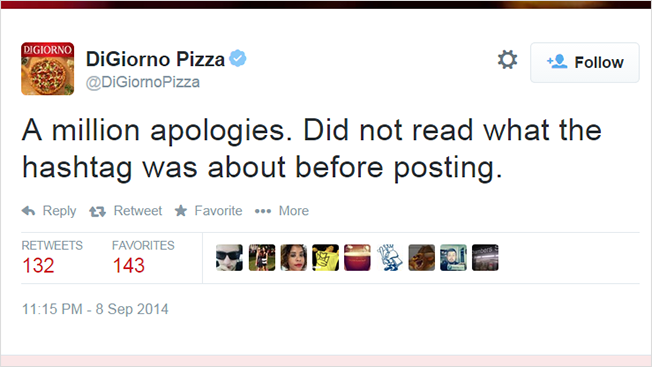An ill-timed tweet or a poorly crafted Facebook post can erode the quality of a business’ brand and lead to a host of negative publicity and awkward public apologies. Take the social media department at DiGiornio, for example, which recently tried to capitalize on a trending Twitter hashtag, “#WhyIStayed.” DiGiorno tweeted in response that they stayed for the pizza. Unfortunately, the “#WhyIStayed” hashtag was based around women who stayed in physically abusive relationships. What was DiGiorno’s mistake: a lack of research.
It is important for digital marketers to figure out the history behind a particular trend before commenting on it or jumping on the latest bandwagon – the negative and positive implications of a social media trend must be fully researched and vetted. In DiGiorno’s case, someone did absolutely no research before blasting out an insensitive tweet.
Besides just doing the research, however, a social media ad or post also has to represent the authenticity of a particular brand. As recently reported by the Financial Times, a company called Tencent, acting on behalf of BMW, sent out a targeted ad via WeChat to individuals in China that it determined were wealthy enough to afford a BMW. At first blush, this would seem like a wise marketing tactic and a way to reach potential consumers.
Nonetheless, when the individuals who didn’t receive the BMW ad learned about their lower perch on the social and economic ladder, Tencent had to deal with their outrage. To make matters worse, Tencent sent the non-BMW worthy consumers ads for soda or a phone instead, which only angered them further.
The following WeChat post in the wake of Tencent’s social media debacle demonstrates the damage a single social media mistake can cause, as one alienated consumer used WeChat to state, “I am nouveau riche in a top-tier city using an Apple 6 plus and I didn’t receive the BMW ads. So I’m going to buy a Mercedes,” source.
The overall message here is simple: a brand has to authentically communicate to its consumers in the digital space. Hyper-targeting and segmentation can sometimes isolate potential customers while damaging a brand’s image. All potential ramifications of any social media communication must be fully examined and contemplated before sent out into the social media jungle.

